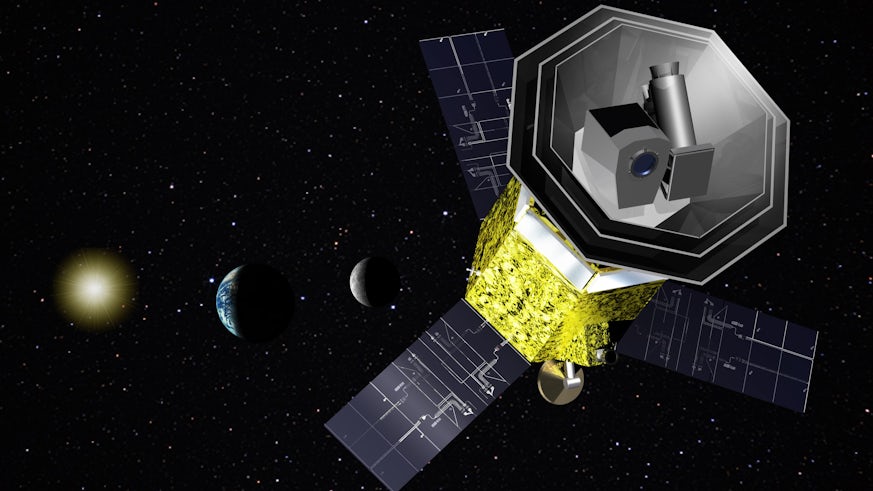Analysing the dying embers of the Big Bang
9 October 2023

A landmark space telescope mission will use Cardiff University technology and expertise to find out more about the earliest stages of the Universe and how it was created over 13.7 billion years ago.
The Lite satellite for the study of B-mode polarization and inflation from cosmic background Radiation Detection (LiteBIRD) mission will analyse the dying embers left over from the Big Bang, to test the current theory of how our Universe expanded immediately after it was formed.
Astronomers believe that immediately after the Big Bang, the Universe underwent an extremely rapid exponential expansion, a process called cosmological inflation.
Their theory predicts that primordial gravitational waves – the very first ripples in space and time in our universe – should result from this rapid expansion, and will be observable in the cosmic microwave background (CMB) – light from the very edge of the observable Universe.
Coordinated by the Japanese Aerospace Exploration Agency (JAXA), LiteBIRD aims to launch in the early 2030s with a combination of high, mid, and low frequency telescopes to examine polarisation in the CMB with unprecedented sensitivity, testing the theory of cosmological inflation.
Leading the UK contribution to the mission, Professors Peter Hargrave and Erminia Calabrese of Cardiff University’s School of Physics and Astronomy will design and build the optics for two telescopes, and the filters for the third, Japanese-built low-frequency telescope.

LiteBIRD will precisely investigate specific properties of this CMB light, to enable us to look for evidence of gravitational waves that should have been caused by inflation, directly after the big bang. This will confirm, or rule out, broad classes of inflation models, and greatly enhance our understanding of the origins of our Universe.
Cardiff Hub for Astrophysics Research and Technology (Co-Director)
Professor Hargrave, LiteBIRD UK Consortium Principal Investigator, added: “It’s great that unique technologies developed by Cardiff University and our UK collaborators can enable such a ground-breaking experiment.”
An initial £2.7 million in funding from the UK Space Agency (UKSA) will enable a team of UK scientists led by Professor Hargrave to design LiteBIRD’s highly specialised telescope instruments and supports the production of the telescopes’ unique lenses and filters at Cardiff University, with support from colleagues at University College London and the Mullard Space Science Laboratory.

Professor Calabrese leads the UK science analysis team, with experts from the Universities of Oxford, Cambridge, Manchester and Sussex.
Professor Calabrese, Co-Principal Investigator and Science Lead of the LiteBIRD UK Consortium, added: “It’s really exciting to see the UK play a key role in one of the most fundamental experiments of the coming decade, contributing to a ground-breaking new understanding of the Big Bang and high-energy physics.

The satellite is designed to yield a major scientific breakthrough: a dramatically improved understanding of how the Universe began, targeting the physical mechanism behind cosmic inflation, either making a discovery or ruling out well-motivated inflationary models.
Astronomy Instrumentation Group and Astronomy Group
Cardiff Hub for Astrophysics Research and Technology
The UKSA intends to invest a total £17 million throughout the life of the mission.
Dr Paul Bate, Chief Executive of the UKSA, said: “We expect LiteBIRD to be a game-changer for our understanding of cosmology, putting our best theories to the test as to what happened at the start of the Universe.
“It’s incredibly exciting for the UK to be at the forefront of this mission, working together with international partners to push the boundaries of space science and answer some of humanity’s biggest questions.”
It’s incredibly exciting for the UK to be at the forefront of this mission, working together with international partners to push the boundaries of space science and answer some of humanity’s biggest questions.
The UK is part of a European Consortium led by the French space agency CNES, who will deliver the high and mid frequency telescopes. Much of the optical design and component development will be led by Cardiff University with support from other UK universities including Cambridge, UCL, Oxford, Manchester and Sussex.
Professor Mike Edmunds, President of the Royal Astronomical Society and Emeritus Professor at Cardiff University’s School of Physics and Astronomy, added: “It’s great to know that the UK will be participating in the exciting JAXA LiteBIRD cosmology mission.
“This satellite will investigate the mechanism of rapid inflation in the very, very early Universe - a fundamental and vitally important idea that has not yet been sufficiently tested.
Share this story
It is a friendly, approachable School with a strong commitment to teaching excellence and world class research in physics and astronomy.





